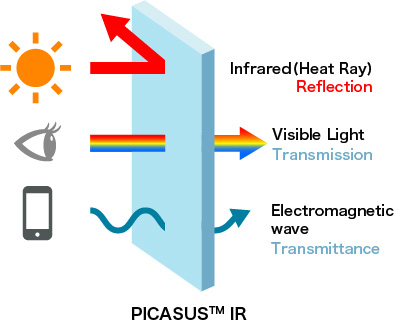Nano-Multilayer Vehicle Film Cuts EV Power Use and Aids 5G Communications

Toray controls the thickness of each nanolayer in its Picasus film to boost advanced mobility performance
Toray Industries Inc., of Tokyo, has developed a high heat-insulating solar control film for electric vehicles (EV) and other advanced mobility applications. The material, an addition to the company’s Picasus line of films made with proprietary nano-multilayer technology, delivers a level of transparency that is comparable to glass and offers significant thermal insulation from the sun’s infrared rays.
In deploying the film in advanced mobility applications, Toray demonstrated that it cuts air conditioning power consumption, which in turn extends vehicle cruising range, and improves cabin comfort by its high thermal insulation. The film’s high radio wave transmission property also supports 5G communication, which is necessary for autonomous driving.
The Picasus lineup includes metallic luster films that uniformly interfere with and reflect light from visible to near-infrared rays, films that cut blue light from displays without coloring them and dichroic films that selectively reflect specific colors.
Up to 1,000 nm Film Layers
Picasus nano-multilayer films incorporate several hundred to 1,000 layers of nanoscale-thick polymers. Toray’s technology controls the thickness of each layer at the nanometer level. Developments stemming from this capability include a high heat-insulating nano-multilayer film with outstanding transparency and thermal insulation that is hard to attain with conventional technologies. The extreme heat insulation of the film stems from controlling the reflection of visible light while improving infrared ray blocking by inserting layers that are tens of nanometers thick into the film structure, with thickness controls in increments of nanometer. In contrast, Toray states that conventional nano-multilayer films alternate layers with thicknesses of around 100 nanometers.
When Toray applied this film to the windshield of an EV, it reduced air conditioner power consumption during summer driving by around 30 percent, which extended cruising range by about 6 percent. The company found that the film boosts passenger comfort by reducing body temperature in summer by 2°C (3.6°F) from levels recorded with conventional heat-insulating windows.
Meanwhile, as advanced mobility applications move closer to commercial reality, it is important to improve radio wave transmission to support 5G mobile networks, since EVs will employ a range of communication devices to enable automated driving and increase safety.
High Insulation and 5G Transmission
The metallic sputter glass that some automobiles incorporate offers superb heat insulation but impedes radio wave transmission. Picasus film is metal-free and so delivers outstanding insulation and transmittance.
Toray is testing film for automotive windshields and sunroofs and conducting customer assessments with a view to deploying the film commercially on vehicles.
As well as improving cruising range and comfort, Toray’s film technology should contribute to carbon neutrality in advanced mobility through its high radio wave transmittance and help expand connected and automated driving technologies.
